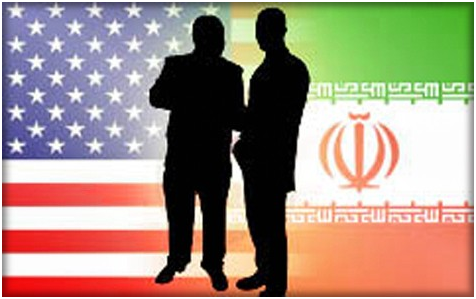Iran set to Replace Israel as Washington's Primary Window Into West Asia
Cloak and dagger meetings!

NEW DELHI: The United States that has been slowly---and even secretly--- taking its eggs out of the Israel basket in West Asia has accelerated the process that has brought Washington and Tehran closer over the last months. A public demonstration of the almost decisive shift in US West Asia policy has come now in the decision to take both Iran and Lebanon’s Hezbollah off the terror list and make it clear that Washington is no longer prepared to hinge its policies for the region to Israel’s increasingly aggressive coattails.
This realisation has been a primary reason for Israeli leader Benjamin Netanyahu’s almost desperate fist-flaying and although he has defied expectations by winning the elections, he has not endeared himself to President Barack Obama. In fact President Obama has not rushed to congratulate Netanyahu and instead his first words were an admonishment for divisive remarks seeking to “marginalise Arab Israeli” citizens. This was in response to the Israeli PM’s campaign where he sought to instil fear in the voters by playing on base sentiments with,” "The right-wing government is in danger. Arab voters are heading to the polling stations in droves. Left-wing NGOs are bringing them in buses."
Netanyahu has repeatedly ruled out the two state solution, which with all the problems is still held as the only solution by most countries including the United States. “I think that anyone who moves to establish a Palestinian state and evacuate territory gives territory away to radical Islamist attacks against Israel," he said in a recent interview to a US magazine.
President Obama’s office issued a statement in direct contradiction of Netanyahu’s position, “The United States and this administration is deeply concerned about rhetoric that seeks to marginalise Arab Israeli citizens.” His press secretary Josh Earnest said, “It undermines the values and democratic ideals that have been important to our democracy and an important part of what binds the United States and Israel together.” These scathing comments came with the assertion from the White House that it was preparing to “reevaluate” its West Asia policy.
This is a major shift, more so as it has now been declared. The US has been uneasy with Netanyahu’s aggressive politics and divisive rhetoric and has been showing signs, visible to West Asia observers in bits and pieces, of opening new channels and new options. President Obama has never really believed his predecessor’s ‘axis of evil’ and in his second term has worked decisively to engage with Iran and restore some level of sanity to the region that is now under the grip of violence that shows no signs of abating. The Islamic State, initially a supported and funded entity, has gone out of control. Also, according to sources, in Washington’s re-assessment Israel’s aggressive war on the Palestinians has contributed greatly to the increasing instability of the region.
While it is too early to say whether Washington is sincere, there are indicators that suggest a movement away from Israel’s influence in determining American foreign policy, and spreading it out in West Asia with other stakeholders. Iran thus is emerging as a ’trusted’ option being more democratic than other countries in the region, and being strongly opposed to terrorism. The Hezbollah that has close relations with Iran is also a powerful political organisation in Lebanon and while dubbed terrorist by former President George W. Bush is certainly not regarded as such by most political groups and/ or governments in the Arab world. Saudi Arabia’s objections arise more from sectarian reasons, than any valid arguments.
The Obama administration has thus made two recent moves that are significant. One, it has openly opposed Netanyahu and made it very clear that his re-election is based on divisiveness that Washington cannot support. Two, it has removed not just Iran but also Hezbollah that had defeated Israel in a bloody conflict, from its terror list. Sources confirmed close cooperation and talks between Washington and Tehran for the region. Bush’s coalition of the willing to wage war against his proscribed axis of evil---including Syria and Iran at the time---is being gradually replaced by support for inclusive coalitions in the region to ensure representation for all stakeholders, regardless of religion or sect. This is being discussed as a possible ‘solution’ for isolating and marginalising the Islamic State of recruits and reasons. As the sources said there are two views on how to fight IS, one that feels the best approach is militaristic and the second, that believes in cutting off the oxygen.
President Obama resisted all opposition to drive the nuclear dialogue with Iran to fruition. A Shia majority country, it has been consistent in opposing terrorism in the region, a major plus that Washington seems to have recognised now.
Jordan is one of the new converts to the ‘inclusive’ approach, having changed policies dramatically after reading the writing on the wall. Iran that has the writ in Iraq is keen to see coalitions representing the population in Baghdad, Damascus, Ankara and other states as well. Washington is clearly now looking to engage with West Asian countries through Iran and not follow Israel’s foreign policy for the region any longer.
The tussle is on, and the next several months will be crucial in determining the shift, one way or the other.



